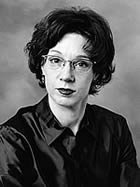SU's Ray Smith Symposium concludes with residencies by art historian, musicologist
Guest scholars discuss Medieval and Renaissance art, music, and gender

The Ray Smith Symposium in Syracuse University’s College of Arts and Sciences concludes its yearlong examination of “Sex and Power from the Middle Ages to the Enlightenment” with mini-residencies by art historian Diane Wolfthal (March 29-30) and musicologist Linda Phyllis Austern (April 12-13).
Wolfthal is on the faculty of Rice University, where she holds the David and Caroline Minter Endowed Chair in the Humanities, and serves as professor of art history. She will present the keynote lecture “Images of Sexual Crime and Punishment in Medieval and Early Modern Europe” on Thursday, March 29. Austern, associate professor of musicology at Northwestern University, will address “'Lo, Here I Burn': Musical Figurations and Fantasies of Male Desire in Early Modern England” on Thursday, April 12.
Both lectures are free and open to the public, and take place at 7 p.m. in SU’s Heroy Geology Laboratory. For more information about the lectures, contact Cassidy Perrault in the college’s Office of Curriculum, Instruction and Programs at 315-443-1414.
The mornings after the lectures, the speakers will participate in Ray Smith-HC Mini-Seminars from 9:30-11:30 a.m. (with breakfast served at 9 a.m.) in The SU Humanities Center Seminar Room (304) of the Tolley Humanities Building. Both seminars are free and open to the public, but require registration. For more information and to register, contact Karen Ortega in The SU Humanities Center at 315-443-5708.
Wolfthal’s presentations will focus on rape, homosexuality and adultery—sexual practices that historically have been of interest to the church and state. “I will show how these acts, considered crimes in medieval and early modern Europe, were represented and punished. I will also compare past attitudes [about them] with today's cultural debates,” she says.
At SU, Wolfthal will draw from two of her books: In and Out of the Marital Bed: Seeing Sex in Late Medieval and Early Modern Art (Yale University Press, 2010), which demonstrates how illicit forms of sexuality were linked to the “chaste sexuality” of marriage, and Images of Rape: The 'Heroic' Tradition and Its Alternatives (Cambridge University Press, 1999), considered the first in-depth exploration of rape, as portrayed in European art from the 1100s-1600s.
In addition to being an art historian, Wolfthal is an expert in feminist and Jewish studies; the history of sexuality; and the intersection of money, values and culture. Also, she is a prolific author and scholar, as evidenced by her role as founding co-editor of Early Modern Women (University of Miami), the only journal devoted to the interdisciplinary and global study of women and gender from the 1400s-1700s.

Arguably, Wolfthal is to art what Austern is to music. The latter is an expert in Renaissance and Baroque musical-cultural relations, gender and feminist theory, European iconography, music as it pertains to visual art and the early history of science.
Austern’s book projects include Music in English Life and Thought: 1550-1650 (forthcoming) and Music in English Children's Drama of the Later Renaissance (Routledge, 1992). She is editor of Psalms in the Early Modern World (Ashgate Publishing, 2011), the first book to explore the use, interpretation, development, translation and influence of the Psalms from the 1400s-1800s; Music of the Sirens (Indiana University Press, 2006); and Music, Sensation and Sensuality (Routledge, 2002).
“Linda Phyllis Austern is a formidable scholar whose work is at the nexus of gender and music,” says Amanda Eubanks Winkler, event organizer, as well as associate professor and chair of art and music histories." At SU, she will discuss how music in early modern England reflected and affected contemporary notions of masculinity.”
This year’s Ray Smith Symposium is organized and presented by the Renaissance and Medieval Studies Working Group, composed of interdisciplinary scholars from across campus. Dympna Callaghan, the William Safire Professor of Modern Letters in the Department of English, has taken a leadership role in the planning.
“We are calling into question modern conceptions of gender by historicizing sexual roles and practices in Europe from the fifth to 18th centuries,” says Callaghan. “Already, the effects of ‘Sex and Power’ have reverberated throughout the academy, giving rise to interdisciplinary conversations about queer-related curriculum, pedagogy and research.”
“Sex and Power” is enabled by a bequest from the estate of Ray W. Smith ’21. Additional support for this year’s programming comes from the Office of the Chancellor; the departments of art and music histories; English; history; languages, literatures and linguistics; women’s and gender studies; the LGBT studies program; and The SU Humanities Center, which sponsors the mini- seminars.
Until June 26, “Sex and Power” is partnering with Syracuse University Library for an exhibition titled “The Power and the Piety: The World of Medieval and Renaissance Europe.” The exhibition showcases a variety of rare books and manuscripts, including illuminated prayer books decorated in gold leaf, a page from the Gutenberg Bible and an antiphonal Elephant Folio, from the Special Collections Research Center. For more information, contact Sean Quimby, librarian and director of the SCRC, at 315-443-9759.
The Ray Smith Symposium is named for the Auburn, N.Y., native who, after graduating from SU in 1921, became a highly respected teacher and administrator.
Media Contact
Rob Enslin
